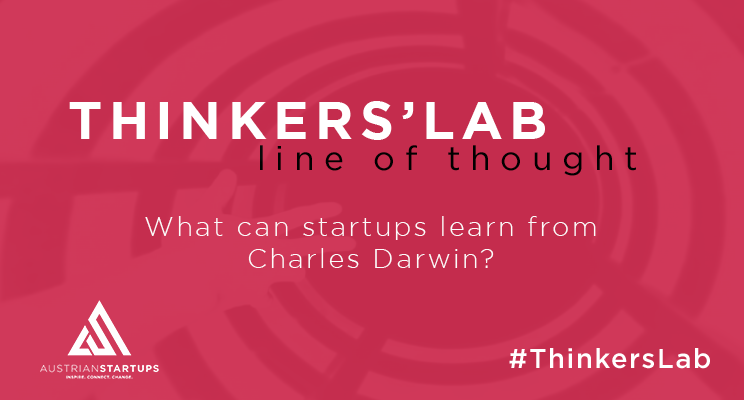Entrepreneurship and science are often considered to be very distant relatives. While scientists discover the secrets of nature, entrepreneurs work on uncovering new opportunities to improve our daily lives.
Still there are some common approaches that both entrepreneurs and scientists take to create innovations, such as experimentation. Whether you are studying the effect of chemical compounds on a virus or choosing the best advertising platform for your product – only experiments will give you a definite answer. A marketing team analysing the results from A/B tests to select the best background colour for their e-commerce platform uses quite similar statistical approaches as scientists.
If we further compare scientific and entrepreneurial approaches to tackle a problem, we will find even more similarities. To make things spicier, let’s move away from the flickering monitors of the twenty-first century and explore what we can learn from the renowned scientist of the 19th century, the father of evolutionary theory, Charles Darwin.
1. Perfectionism is your enemy
Competition is the best medicine against perfectionism. Charles Darwin was prompted to publish his groundbreaking book On the Origin of Species because of the threat of being scooped by another scientist, Alfred Russel Wallace. Although Darwin was not satisfied with the quality of the early draft of On the Origin of Species, his minimal viable product, or MVP, this manuscript has become one of the most influential scientific books in the history of humankind.
The early release of MVP is emphasized in the iconic book The Lean Startup by Eric Ries, who defines it as “that version of a new product which allows a team to collect the maximum amount of validated learning about customers with the least effort”1. The earlier you get feedback on your product, the more resources and time you have to improve it.
2. Ideas come first, details – last
The theory of evolution developed by Charles Darwin has become an Ariadne’s thread for all branches of biology. It has created a general structure of the tree of life explaining how different species originated and evolved. Today it doesn’t matter if you are studying tiny molecules or giant elephants – evolution is the main guiding principle behind any biological discipline.
Startups also use a general framework regardless of the industries they are operating in. Entrepreneurs start with ideation and creating prototypes. A process of trial and errors help startups to learn about customer needs and adapt to new challenges. Experimentation is a key to this growth process2.
3. Collect data before you jump to conclusions
Charles Darwin spent almost five years as a naturalist on the ship “Beagle” travelling around the world. He collected evidence of different geological periods that our planet lived through in the past, dug up fossils of giant ground sloth in South America and documented data on the diversity and evolution of finches at Galapagos Islands. Darwin brought home fifteen notebooks from his journey filled with pictures and observations that played a crucial role in shaping his view of evolution. It took him almost two decades to explore these data systematically and turn the collection of facts into the fully formed theory3.
In the modern world in which we are saturated with information the ability to extract and organise essential facts is a valuable skill. Since data is a fuel for growth hacking, companies that routinely analyse customer’s behaviour and use this information to adjust their products or services demonstrate sustainable growth in sales and attract new customers 4,5.
4. Your failures might be the seeds of your success
Charles Darwin was definitely not the best student. In fact, he even dropped out of medical school at Edinburgh University. His father, a renown medical doctor, once told Charles: ”You care for nothing but shooting, dogs, and rat-catching, and you will be a disgrace to yourself and all your family.” Well, Darwin turned his early passion for “rat-cathing” into his profession and became one of the most prominent scientists in the history of humankind.
A great example of turning failure into commercial success which can be found in the world of product design is the humble Post-it. The small sticky paper that can be easily glued to your notes and torn off multiple times is wildly popular around the world. Post-it notes are produced and sold in colossal quantities – over 50 billion units per year. This product was originally developed based on a weak glue invented in 1968 by Dr Spencer Silver, a scientist from American company 3M. Actually, Dr Silver was aiming to develop a super-strong glue. Despite his best efforts, Silver’s glue was very weak. On the bright side – this weak glue was pressure-sensitive and reusable. Most people were unconvinced by a glue that did not stick properly, but Art Fry, a colleague of Dr Silver, came up with the bright idea of using it for reusable sticking paper. And so the Post-it was born, a product which is now sold in over 100 countries worldwide7,8.
5. Think big!
Not only did Darwin found the new science – evolutionary biology – but he has also transformed our outlook on the world. The theory of evolution had a lasting impact on various components of our civilization including art, philosophy and politics.
Radical innovations have profound effects on our lives. The most successful entrepreneurs are not the ones who sell the most, but the ones who transform industries. Big-picture thinking helps to achieve intermediate goals and communicate key messages to the general public. Would you be more interested to read an article about a company which develops novel rockets or about a company with ambitions to colonize Mars? Ask Elon Musk about it.
Scientists and entrepreneurs know that there is no easy path to innovations. They have learned the hard way that experimenting, analysing data, fighting perfectionism, failing and starting over is the only viable approach to succeed in expanding our knowledge about the world and advancing our society. Probably the goals and approaches of science and entrepreneurship are not that different, after all?
References:
1. Eric Ries, Minimum Viable Product: a guide. August 3, 2009 / http://www.startuplessonslearned.com/2009/08/minimum-viable-product-guide.html?m=1
2. https://www.derstandard.at/story/2000102658995/start-up-gruenden-eine-anleitung-in-fuenf-schritten
3. Irving Stone, The Origin: A Biographical Novel of Charles Darwin. July 8th 1980, Doubleday, 0385120648 (ISBN13: 9780385120647)
4. Deloitte The Analytics Advantage We’re just getting started. 2013 /https://www2.deloitte.com/content/dam/Deloitte/global/Documents/Deloitte-Analytics/dttl-analytics-analytics-advantage-report-061913.pdf
5. https://www.dataquest.io/blog/data-analytics-startups-what-you-need-to-know/
6. Michael Bonsall and Brian Charlsworth, Genetics and the causes of evolution: 150 years of progress since Darwin. Philos Trans R Soc Lond B Biol Sci. August 27, 2010; 365(1552): 2427–2429.doi: 1098/rstb.2010.0109 / https://www.ncbi.nlm.nih.gov/pmc/articles/PMC2935109/
7. Nick Glass and Tim Hume, The ‘hallelujah moment’ behind the invention of the Post-it note. April 4, 2013 / https://ecnn.com/2013/04/04/tech/post-it-note-history/index.html
8. https://www.post-it.com/3M/en_US/post-it/contact-us/about-us/





